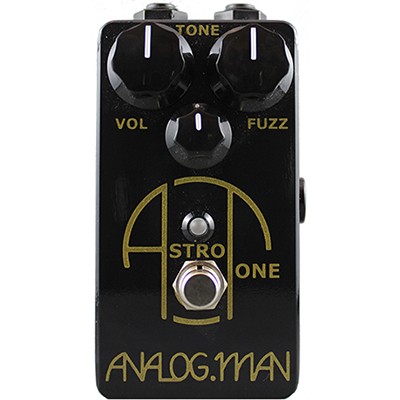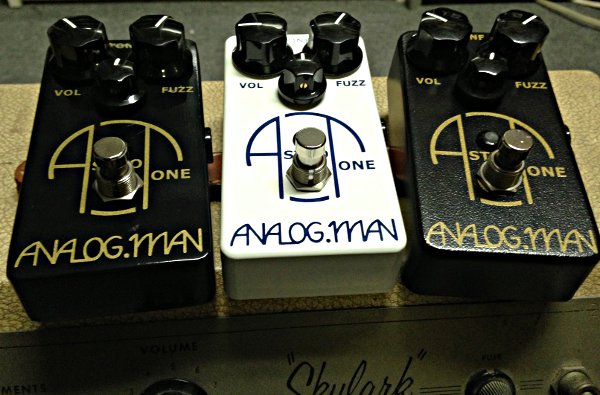 Fuzz pedals are notoriously finicky. Not only can some fuzz boxes themselves sound different based on their own component variances and the environment or temperature they are used in, but they are always dependent on the gear that they are being used with as well. Case in point is the classic germanium Fuzz Face beloved by Hendrix. Sure, when it’s in front of a Marshall that is already overdriven, you’ll get some magic happening by adding those bits of germanium magic. But…
Fuzz pedals are notoriously finicky. Not only can some fuzz boxes themselves sound different based on their own component variances and the environment or temperature they are used in, but they are always dependent on the gear that they are being used with as well. Case in point is the classic germanium Fuzz Face beloved by Hendrix. Sure, when it’s in front of a Marshall that is already overdriven, you’ll get some magic happening by adding those bits of germanium magic. But…
…stick that same Fuzz Face in front of a Fender blackface amp and you’ll hear a whole different, and very ugly, side to the Fuzz Face. And turn on the bright switch on your old blackface and you’ll be pummeled with an even more horrid and brittle sound.
Silicon fuzzes tend to be a little more forgiving, but even a silicon version of the Fuzz Face can be particular about where it’s used. And what about the classic EH Big Muff? That beast of a fuzz can easily get lost in the mix if you’re playing it through an amp that’s already naturally mid-scooped (think about those classic Fenders once more).
Analog Man Mike Piera developed the Astro Tone pedal in 2010 based on a version of one of his favorite fuzz units, the Astrotone and Sam Ash Fuzz Boxx from the mid 1960s. Mike’s objective was simple. He wanted a Fuzz that would play well into Fender amps with his Gibson guitars. Mike loved the overall sound of the Astrotone of the 1960s, except he found it to be a bit too thin-sounding, especially on the low end. So he began to do a rework of it and the Analog Man Astro Tone was born.
I was turned on to the Analog Man Astro Tone by accident, through friend-in-tone George Lynch, who raved about it. I borrowed his, plugged it into my Deluxe Reverb with my Stratocaster, and within 10 minutes placed an order to get one of my own.
 Now having spent some more time with the Analog Man Astro Tone, I have to say it sounds like a perfect merging of a fuzz and distortion. In rehearsal with a band – often the true test of how any gear will really sound and work – the Astro Tone brought a fresh character of distortion and drive. It cut through the mix well. The Astro Tone is balanced – not mid-scooped like a Big Muff, or shrill/bright like a Fuzz Face can be. It’s quite surprising how contemporary and versatile this fuzz is in fact!
Now having spent some more time with the Analog Man Astro Tone, I have to say it sounds like a perfect merging of a fuzz and distortion. In rehearsal with a band – often the true test of how any gear will really sound and work – the Astro Tone brought a fresh character of distortion and drive. It cut through the mix well. The Astro Tone is balanced – not mid-scooped like a Big Muff, or shrill/bright like a Fuzz Face can be. It’s quite surprising how contemporary and versatile this fuzz is in fact!
When running the Astro Tone into my 1970s Marshall, akin to how I’d run it just like a Fuzz Face, the Astro Tone provides a great boost which is harmonically enhanced by way of its two silicon transistors. Unlike the silicon version of the Fuzz Face, the Astro Tone doesn’t get overly bassy or loose on the bass frequencies. It took to its task beautifully and added sustain and compression perfect for soloing.
With basic controls for Volume, Tone and Fuzz, the Astro Tone was easily shaped into providing very pleasing and smooth distorted sounds whether I used a guitar with humbuckers or single coils. It provides a comfortable medium amount of distortion and at the heart of the Astro Tone is the use of NOS Fairchild silicon transistors. The downside? When supply of these transistors is gone, production of the Astro Tone will end.
The Astro Tone, besides being sonically tweaked to Mike Piera’s liking, also includes updated features from the original including true bypass switching, standard negative ground 9v DC power (still can be battery powered as well), LED indicator, and top-mounted input and output jacks that will maximize space on a cramped pedal board. The Astro Tone is also available in several different finishes and can be purchased directly from Analog Man for $185 at www.buyanalogman.com.
If you’re a Fuzz guy, the Astro Tone just may become your new favorite tone tool. And if you hate fuzz (as I have admittedly in the past), the Analog Man Astro Tone just may win you over. For something that uses old school components, the Astro Tone has an amazingly full and sonically rich range available to it that is quite pleasing to the ear. Definitely check one of these out if you’re looking for some new distortion flavor. For sound clips and more information on the Analog Man Astro Tone, check out the page all about it here. We don’t often rave about every product we review, but the Analog Man Astro Tone is one of those hidden gems that we’re sure most players will love.